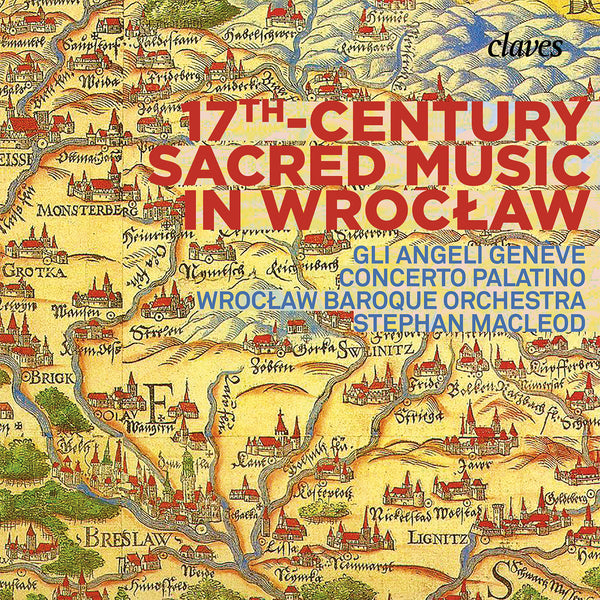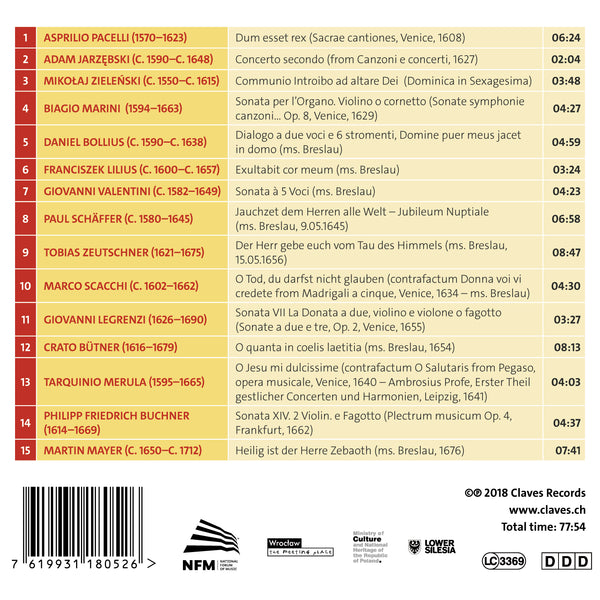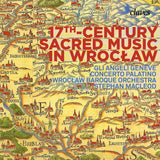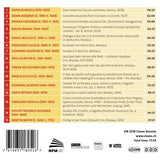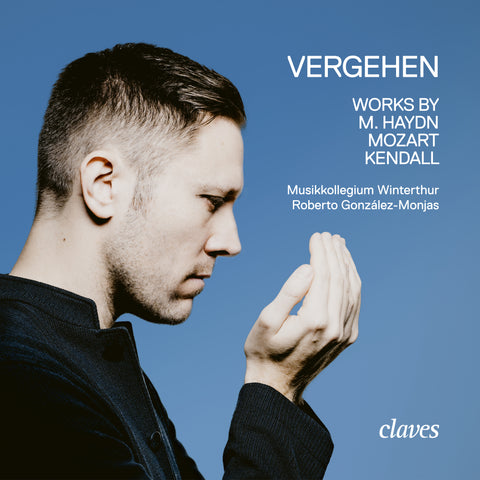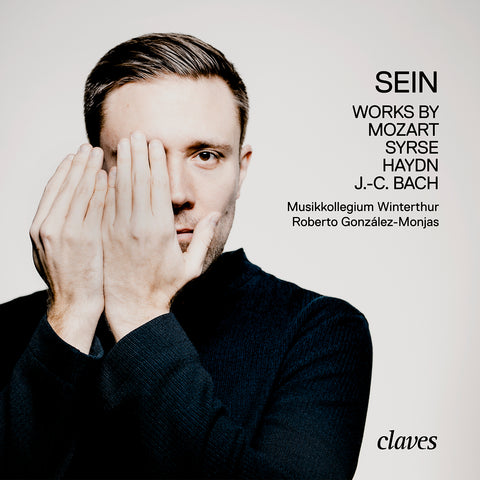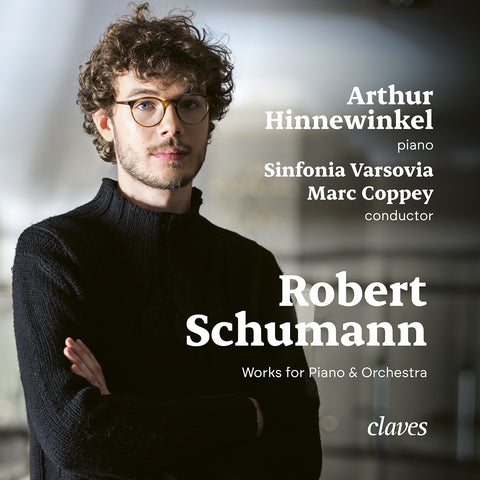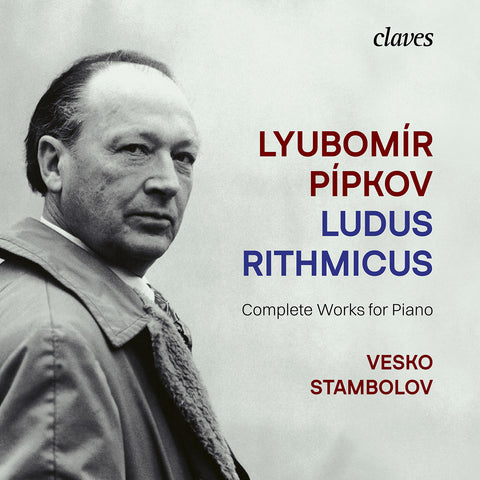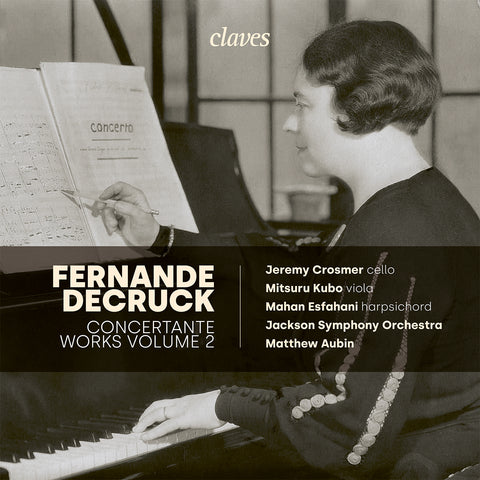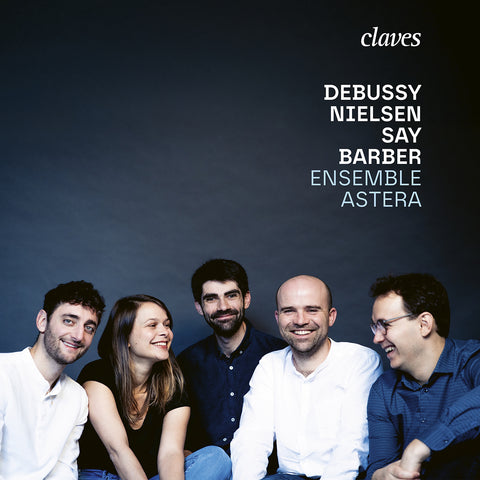(2018) 17th Century Sacred Music in Wroclaw
Category(ies): Ancient music Concerto Oper vocal Rarities
Instrument(s): Cello Organ Viola Violin
Vocal(s): Alto Soprano Tenor
Orchestra: Wrocław Baroque Orchestra
Conductor: Stephan MacLeod
CD set: 1
Catalog N°:
CD 1805
Release: 04.05.2018
EAN/UPC: 7619931180526
This album is now on repressing. Pre-order it at a special price now.
CHF 18.50
This album is no longer available on CD.
This album has not been released yet. Pre-order it from now.
CHF 18.50
This album is no longer available on CD.
CHF 18.50
VAT included for Switzerland & UE
Free shipping
This album is no longer available on CD.
VAT included for Switzerland & UE
Free shipping
This album is now on repressing. Pre-order it at a special price now.
CHF 18.50
This album is no longer available on CD.
This album has not been released yet.
Pre-order it at a special price now.
CHF 18.50
This album is no longer available on CD.
CHF 18.50
This album is no longer available on CD.
17TH CENTURY SACRED MUSIC IN WROCLAW
*** ICMA 2019 Winner in Baroque Vocal category ***
Seventeenth-century Wrocław (then Breslau) was one of Europe’s important musical centres. Its three main Protestant churches – St. Elisabeth, St. Mary Magdalene and St. Bernardine – collected extensive music libraries. Their repertoire was shaped both by prints imported from Italy and Germany, and by works composed by local cantors and organists employed in church ensembles. A separate collection of nearly 400 prints from 1610–55 reposed in private hands for most of the century. It had probably been initiated by Ambrosius Profe, the organist of the Church of St. Elizabeth in 1633–49, and later owned by Daniel Sartorius, a teacher in the church gymnasium. After the latter’s death the music prints were incorporated into the Biblioteca Rhedigeriana, a collection of rare manuscripts, prints, paintings, sculptures, coins and minerals assembled by a Breslau patrician Thoms Rhediger (1540–76). It was deposited in a room over the sacristy at St. Elisabeth Church, bequeathed to the city in 1645 and opened to the public in 1661. The Stadtbibliothek, newly established in 1856–67, took over all these music collections. During World War II, however, they were taken away from the city and dispersed after 1945. Some items have not been found until now. The majority of the prints returned to Wrocław. Numerous manusripts were considered lost until the late 1980s, when they reappeared in the Berlin Staatsbibliothek. They found their way there from Moscow, where some items of the former Breslau library still remain.
Attempting to draw a panorama of seventeenth-century sacred music from Breslau, we present on this CD works that are mostly unique, preserved only in the four collections of Wrocław provenance. The pieces stem from the period 1608–76 and were composed by Italian, German, Polish and local Breslau musicians. They give witness to the city’s broad musical horizons and its former artistic splendour.
The two earliest works come from prints that once belonged to the Church of St. Bernardine. Dum esset rex, a motet scored for twenty voices divided into five choirs, concludes the collection of Sacrae cantiones by Asprilio Pacelli, who after receiving his education in Rome served as maestro di cappella (1602–23) to the Polish king Sigismund III Vasa. The monumental Offertoria et communiones totius anni by Mikołaj Zieleński, maestro di cappella of the Polish primate Wojciech Baranowski at Łowicz, also adhere to the late 16th-century style. In some of the communiones, however, Zieleński entrusts the entire polyphonic fabric to the organ, and only one voice out of four is intended to be sung with virtuoso embellishment.
[..]
The lastest work on this CD comes again from the Church of St. Bernardine and was composed by Martin Mayer, the church’s organist in 1671–79, as part of his annual set (‘Jahrsgang’) of sacred concertos. After his death, that Jahrsgang was ‘taken over’ from his heirs and incorporated into the music library of the church. Written for the Trinity Sunday, Heilig ist der Herre Zebaoth is one of the most lavish of Mayer’s concertos in terms of both its sumptuous scoring and a multisectional form with a recurring refrain.
Marcin Szelest
WROCŁAW BAROQUE ORCHESTRA
The Wrocław Baroque Orchestra was founded by Andrzej Kosendiak in 2006. It is a resident ensemble of the National Forum of Music in Wrocław, one of few performing arts organizations in Poland that can boast a Baroque orchestra playing historical instruments. During each NFM season the orchestra presents its own concert series, always ardently received by the audience. The repertoire encompasses works from early Baroque to Romanticism, from chamber compositions to great oratorios. The superb cellist Jarosław Thiel has been Artistic Director of the WBO ever since the onset of its activities.
Nowadays the Wrocław Baroque Orchestra ranks among the most important Polish ensembles playing historical instruments. The output and artistic level of this group – acclaimed by critics and audiences alike – bears fruit in collaborations with the greatest names on the international early music scene. The orchestra is invited to prestigious festivals, participates in broadcasts and recording sessions. It has performed under the baton of Philippe Herreweghe, Giovanni Antonini, Andrew Parrott, Paul McCreesh, Andreas Spering, Hans-Christoph Rademann, Laurence Cummings, Rubén Dubrovsky, and Christian Curnyn. The guests of the WBO have been excellent ensembles and soloists, inter alia Collegium Vocale Gent, Cantus Cölln, Taverner Consort, Dresdner Kammerchor, Gli Angeli Genève, Olga Pasichnyk, Julia Lezhneva, Renata Pokupić, Nicholas Mulroy, Daniel Taylor, and Aleksandra Kurzak.
The first CD of the Wrocław Baroque Orchestra won Fryderyk Award in the phonographic debut of the year category, and the recordings that followed were honoured with several nominations for the same award. 2017 saw the release of a CD resulting from WOB’s collaboration with Paul McCreesh and his Gabrieli Consort & Players – Haydn The Seasons.
GLI ANGELI GENÈVE
Gli Angeli Genève was founded by Stephan MacLeod in 2005 and is an ensemble of varying composition that performs vocal and instrumental repertoire of the renaissance, baroque and classical periods. It is made up of musicians who either have solo careers of their own or who are chamber recitalists in the field of Baroque music but who are not exclusively active in this clearly defined area: in other words, they perform more than just early music, their eclecticism guaranteeing their enthusiasm and the sincerity of their research. While performing the complete Bach cantatas, Gli Angeli Genève is also seeking to introduce younger audiences to music in the form of a teaching programme based around Bach and period instruments. Children are able to attend their rehearsals and to take part in demonstrations, becoming familiar with the different families of instruments over the centuries, meeting the members of the ensemble and singing with them at school concerts.
A part from all Bach Cantatas in their own series in Geneva, Gli Angeli Genève is initiating a new adventure in September 2017 with the start of the performing of all Haydn Symphonies in concert in Geneva over a decade. The ensemble is regularly invited in leading festivals and concert venues all around the world.
STEPHAN MACLEOD, CONDUCTOR
Born in Geneva, Stephan MacLeod first played the violin and the piano and then studied singing with Kurt Moll in Cologne and with Gary Magby in Lausanne. Active all over the world as a renowned concert singer since his early twenties, his desire to conduct started together with his singing career and he finally founded eleven years ago his own ensemble, Gli Angeli Genève, where he both sings and leads. Gli Angeli Genève is giving its season of concerts in Geneva since 2005, and is now regularly invited in most European concert halls and leading festivals for ancient music. As a singer, his career started through an intense collaboration with Reinhard Goebel and Musica Antiqua Köln when he was 20 years old.
He’s been particularly active in the oratorio repertoire since, particularly under Philippe Herreweghe, Gustav Leonhardt(†), Franz Brüggen(†), Masaaki Suzuki (Bach Collegium Japan), Jordi Savall, Philippe Pierlot (Ricercar Consort), Michel Corboz, Daniel Harding, Vaclav Luks, Sigiswald Kuijken, Konrad Junghänel (Cantus Cölln), Christophe Coin, Helmut Rilling, Frieder Bernius, Jos Van Immerseel, Jésus López-Cobos, Hervé Niquet, Paul Van Nevel (Huelgas Ensemble), and with such ensembles as the Akademie für Alte Musik Berlin, Musica Antiqua Köln, the Freiburger Barockorchester, Tafelmusik or the RIAS-Kammerchor.
Stephan MacLeod has been heard as a concert soloist and in recitals in most of the main music centers and festivals in Europe, as well as in the USA, Canada, South America or China, and is a frequent visitor to Japan. His work has been documented on more than 75 CD’s, many of which have won awards in the press. He teaches in Switzerland, where he holds a professorship in singing at the Haute Ecole de Musique of Lausanne. He is singing and conducting all over the world.
CONCERTO PALATINO
The names Bruce Dickey and Charles Toet are practically synonymous with the modern revival of the cornetto and the Baroque trombone and are largely responsible for the enormous advances that have been made in the last 20 years in playing standards on these instruments. In a collaboration of some 25 years, they have together trained a whole generation of cornetto and trombone players, many of whom have become regular members of Concerto Palatino.
While the core group is comprised of two cornetti and three trombones, this formation is frequently augmented by the addition of brass players, strings, or singers as necessary. Inevitably, much of their repertoire is sacred, as these instruments were a fixture of musical chapels in both the Catholic south and the Protestant north, from the time of the first flowering of Flemish polyphony in the early 16th century through their twilight years at the time of J.S. Bach, one of the last composers to employ them in a serious way.
Concerto Palatino frequently collaborates with other leading ensembles, in particular Cantus Cölln (Konrad Junghänel), Collegium Vocale Ghent (Philippe Herreweghe), La Dolcezza (Veronika Skuplik), the Amsterdam Baroque Orchestra (Ton Koopman), and the Bach Collegium Japan (Masaaki Suzuki).
Concerto Palatino places a high priority on unearthing neglected gems of music history and giving them a place in the concert hall and record catalogs alongside the works of established masters. Thus, in addition to highly acclaimed recordings of Schütz, Gabrieli, and Monteverdi, they have made premiere recordings of the Marian Vespers by Cavalli, the Missa Maria Concertata by C. Strauss, and Palestrina’s Missa sine nomine preserved in a manuscript by J.S. Bach. Their numerous recordings for EMI Reflexe, Accent, and harmonia mundi France have received high acclaim.
PERFORMERS
Stephan MacLeod – Conductor
GLI ANGELI GENÈVE
Aleksandra Lewandowska, Grace Davidson – Sopranos
Alex Potter – Alto
Jan Kobow, Stephan Gähler – Tenors
Stephan MacLeod – Bass
Marzena Michałowska, Aleksandra Turalska – Sopranos
Piotr Olech – Alto
Maciej Gocman, Václav Čížek – Tenors
Jaromír Nosek – Bass
CONCERTO PALATINO
Bruce Dickey, Gawain Glenton – Cornets
Simen Van Mechelen, Claire MacIntyre, Charles Toet, Joost Swinkels – Trombones
WROCŁAW BAROQUE ORCHESTRA
Zbigniew Pilch (Leader), Adam Pastuszka – Violins
Dominika Małecka – Viola
Jarosław Thiel (Artistic Director) – Cello
Ondřej Štajnochr – Violone
Adrian Rovatkay – Dulcian
Marcin Szelest (Musicologist, Artistic Consultant) – Organ
*** ICMA 2019 Winner in Baroque Vocal category ***
Seventeenth-century Wrocław (then Breslau) was one of Europe’s important musical centres. Its three main Protestant churches – St. Elisabeth, St. Mary Magdalene and St. Bernardine – collected extensive music libraries. Their repertoire was shaped both by prints imported from Italy and Germany, and by works composed by local cantors and organists employed in church ensembles. A separate collection of nearly 400 prints from 1610–55 reposed in private hands for most of the century. It had probably been initiated by Ambrosius Profe, the organist of the Church of St. Elizabeth in 1633–49, and later owned by Daniel Sartorius, a teacher in the church gymnasium. After the latter’s death the music prints were incorporated into the Biblioteca Rhedigeriana, a collection of rare manuscripts, prints, paintings, sculptures, coins and minerals assembled by a Breslau patrician Thoms Rhediger (1540–76). It was deposited in a room over the sacristy at St. Elisabeth Church, bequeathed to the city in 1645 and opened to the public in 1661. The Stadtbibliothek, newly established in 1856–67, took over all these music collections. During World War II, however, they were taken away from the city and dispersed after 1945. Some items have not been found until now. The majority of the prints returned to Wrocław. Numerous manusripts were considered lost until the late 1980s, when they reappeared in the Berlin Staatsbibliothek. They found their way there from Moscow, where some items of the former Breslau library still remain.
Attempting to draw a panorama of seventeenth-century sacred music from Breslau, we present on this CD works that are mostly unique, preserved only in the four collections of Wrocław provenance. The pieces stem from the period 1608–76 and were composed by Italian, German, Polish and local Breslau musicians. They give witness to the city’s broad musical horizons and its former artistic splendour.
The two earliest works come from prints that once belonged to the Church of St. Bernardine. Dum esset rex, a motet scored for twenty voices divided into five choirs, concludes the collection of Sacrae cantiones by Asprilio Pacelli, who after receiving his education in Rome served as maestro di cappella (1602–23) to the Polish king Sigismund III Vasa. The monumental Offertoria et communiones totius anni by Mikołaj Zieleński, maestro di cappella of the Polish primate Wojciech Baranowski at Łowicz, also adhere to the late 16th-century style. In some of the communiones, however, Zieleński entrusts the entire polyphonic fabric to the organ, and only one voice out of four is intended to be sung with virtuoso embellishment.
[..]
The lastest work on this CD comes again from the Church of St. Bernardine and was composed by Martin Mayer, the church’s organist in 1671–79, as part of his annual set (‘Jahrsgang’) of sacred concertos. After his death, that Jahrsgang was ‘taken over’ from his heirs and incorporated into the music library of the church. Written for the Trinity Sunday, Heilig ist der Herre Zebaoth is one of the most lavish of Mayer’s concertos in terms of both its sumptuous scoring and a multisectional form with a recurring refrain.
Marcin Szelest
WROCŁAW BAROQUE ORCHESTRA
The Wrocław Baroque Orchestra was founded by Andrzej Kosendiak in 2006. It is a resident ensemble of the National Forum of Music in Wrocław, one of few performing arts organizations in Poland that can boast a Baroque orchestra playing historical instruments. During each NFM season the orchestra presents its own concert series, always ardently received by the audience. The repertoire encompasses works from early Baroque to Romanticism, from chamber compositions to great oratorios. The superb cellist Jarosław Thiel has been Artistic Director of the WBO ever since the onset of its activities.
Nowadays the Wrocław Baroque Orchestra ranks among the most important Polish ensembles playing historical instruments. The output and artistic level of this group – acclaimed by critics and audiences alike – bears fruit in collaborations with the greatest names on the international early music scene. The orchestra is invited to prestigious festivals, participates in broadcasts and recording sessions. It has performed under the baton of Philippe Herreweghe, Giovanni Antonini, Andrew Parrott, Paul McCreesh, Andreas Spering, Hans-Christoph Rademann, Laurence Cummings, Rubén Dubrovsky, and Christian Curnyn. The guests of the WBO have been excellent ensembles and soloists, inter alia Collegium Vocale Gent, Cantus Cölln, Taverner Consort, Dresdner Kammerchor, Gli Angeli Genève, Olga Pasichnyk, Julia Lezhneva, Renata Pokupić, Nicholas Mulroy, Daniel Taylor, and Aleksandra Kurzak.
The first CD of the Wrocław Baroque Orchestra won Fryderyk Award in the phonographic debut of the year category, and the recordings that followed were honoured with several nominations for the same award. 2017 saw the release of a CD resulting from WOB’s collaboration with Paul McCreesh and his Gabrieli Consort & Players – Haydn The Seasons.
GLI ANGELI GENÈVE
Gli Angeli Genève was founded by Stephan MacLeod in 2005 and is an ensemble of varying composition that performs vocal and instrumental repertoire of the renaissance, baroque and classical periods. It is made up of musicians who either have solo careers of their own or who are chamber recitalists in the field of Baroque music but who are not exclusively active in this clearly defined area: in other words, they perform more than just early music, their eclecticism guaranteeing their enthusiasm and the sincerity of their research. While performing the complete Bach cantatas, Gli Angeli Genève is also seeking to introduce younger audiences to music in the form of a teaching programme based around Bach and period instruments. Children are able to attend their rehearsals and to take part in demonstrations, becoming familiar with the different families of instruments over the centuries, meeting the members of the ensemble and singing with them at school concerts.
A part from all Bach Cantatas in their own series in Geneva, Gli Angeli Genève is initiating a new adventure in September 2017 with the start of the performing of all Haydn Symphonies in concert in Geneva over a decade. The ensemble is regularly invited in leading festivals and concert venues all around the world.
STEPHAN MACLEOD, CONDUCTOR
Born in Geneva, Stephan MacLeod first played the violin and the piano and then studied singing with Kurt Moll in Cologne and with Gary Magby in Lausanne. Active all over the world as a renowned concert singer since his early twenties, his desire to conduct started together with his singing career and he finally founded eleven years ago his own ensemble, Gli Angeli Genève, where he both sings and leads. Gli Angeli Genève is giving its season of concerts in Geneva since 2005, and is now regularly invited in most European concert halls and leading festivals for ancient music. As a singer, his career started through an intense collaboration with Reinhard Goebel and Musica Antiqua Köln when he was 20 years old.
He’s been particularly active in the oratorio repertoire since, particularly under Philippe Herreweghe, Gustav Leonhardt(†), Franz Brüggen(†), Masaaki Suzuki (Bach Collegium Japan), Jordi Savall, Philippe Pierlot (Ricercar Consort), Michel Corboz, Daniel Harding, Vaclav Luks, Sigiswald Kuijken, Konrad Junghänel (Cantus Cölln), Christophe Coin, Helmut Rilling, Frieder Bernius, Jos Van Immerseel, Jésus López-Cobos, Hervé Niquet, Paul Van Nevel (Huelgas Ensemble), and with such ensembles as the Akademie für Alte Musik Berlin, Musica Antiqua Köln, the Freiburger Barockorchester, Tafelmusik or the RIAS-Kammerchor.
Stephan MacLeod has been heard as a concert soloist and in recitals in most of the main music centers and festivals in Europe, as well as in the USA, Canada, South America or China, and is a frequent visitor to Japan. His work has been documented on more than 75 CD’s, many of which have won awards in the press. He teaches in Switzerland, where he holds a professorship in singing at the Haute Ecole de Musique of Lausanne. He is singing and conducting all over the world.
CONCERTO PALATINO
The names Bruce Dickey and Charles Toet are practically synonymous with the modern revival of the cornetto and the Baroque trombone and are largely responsible for the enormous advances that have been made in the last 20 years in playing standards on these instruments. In a collaboration of some 25 years, they have together trained a whole generation of cornetto and trombone players, many of whom have become regular members of Concerto Palatino.
While the core group is comprised of two cornetti and three trombones, this formation is frequently augmented by the addition of brass players, strings, or singers as necessary. Inevitably, much of their repertoire is sacred, as these instruments were a fixture of musical chapels in both the Catholic south and the Protestant north, from the time of the first flowering of Flemish polyphony in the early 16th century through their twilight years at the time of J.S. Bach, one of the last composers to employ them in a serious way.
Concerto Palatino frequently collaborates with other leading ensembles, in particular Cantus Cölln (Konrad Junghänel), Collegium Vocale Ghent (Philippe Herreweghe), La Dolcezza (Veronika Skuplik), the Amsterdam Baroque Orchestra (Ton Koopman), and the Bach Collegium Japan (Masaaki Suzuki).
Concerto Palatino places a high priority on unearthing neglected gems of music history and giving them a place in the concert hall and record catalogs alongside the works of established masters. Thus, in addition to highly acclaimed recordings of Schütz, Gabrieli, and Monteverdi, they have made premiere recordings of the Marian Vespers by Cavalli, the Missa Maria Concertata by C. Strauss, and Palestrina’s Missa sine nomine preserved in a manuscript by J.S. Bach. Their numerous recordings for EMI Reflexe, Accent, and harmonia mundi France have received high acclaim.
PERFORMERS
Stephan MacLeod – Conductor
GLI ANGELI GENÈVE
Aleksandra Lewandowska, Grace Davidson – Sopranos
Alex Potter – Alto
Jan Kobow, Stephan Gähler – Tenors
Stephan MacLeod – Bass
Marzena Michałowska, Aleksandra Turalska – Sopranos
Piotr Olech – Alto
Maciej Gocman, Václav Čížek – Tenors
Jaromír Nosek – Bass
CONCERTO PALATINO
Bruce Dickey, Gawain Glenton – Cornets
Simen Van Mechelen, Claire MacIntyre, Charles Toet, Joost Swinkels – Trombones
WROCŁAW BAROQUE ORCHESTRA
Zbigniew Pilch (Leader), Adam Pastuszka – Violins
Dominika Małecka – Viola
Jarosław Thiel (Artistic Director) – Cello
Ondřej Štajnochr – Violone
Adrian Rovatkay – Dulcian
Marcin Szelest (Musicologist, Artistic Consultant) – Organ
Return to the album | Read the booklet | Main Artist: Stephan MacLeod
STUDIO MASTER (HIGH-RESOLUTION AUDIO)
Amethys Design
Ancient music
Cello
Claves picks
Clé du mois - ResMusica
Concerto
Concerto Palatino
Double bass
Gli Angeli Genève
High-resolution audio - Studio master quality
ICMA 2019
ICMA Awards
In stock
Opera vocal
Organ
Pizzicato.lu - Supersonic
Popular products
Rarities
Soprano
Stephan MacLeod
Tenor
Viola
Violin
Wrocław Baroque Orchestra
Amethys Design
Ancient music
Cello
Claves picks
Clé du mois - ResMusica
Concerto
Concerto Palatino
Double bass
Gli Angeli Genève
High-resolution audio - Studio master quality
ICMA 2019
ICMA Awards
In stock
Opera vocal
Organ
Pizzicato.lu - Supersonic
Popular products
Rarities
Soprano
Stephan MacLeod
Tenor
Viola
Violin
Wrocław Baroque Orchestra







